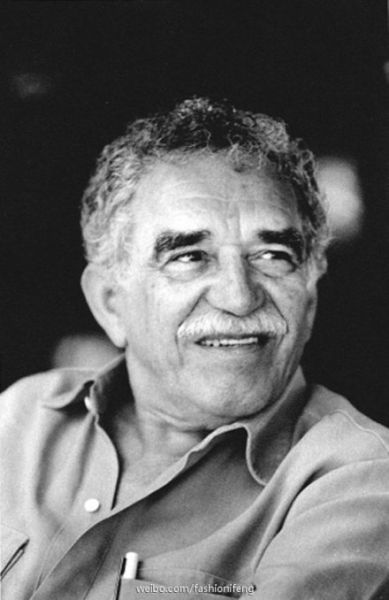双语:《百年孤独》作者马尔克斯去世(图)
新浪教育[微博]编译:加西亚·马尔克斯,著作《百年孤独》。于北京时间2014年4月18日凌晨在墨西哥家中因病去世,享年87岁。
 加西亚·马尔克斯
加西亚·马尔克斯马尔克斯曾在1982年获得诺贝尔文学奖,并任法国西班牙语文化交流委员会主席。1982年,哥伦比亚地震,他回到祖国。1999年不幸患上淋巴癌,此后文学产量遽减。2006年1月宣布封笔。
马尔克斯1927年3月6日出生于哥伦比亚沿海小镇阿拉卡塔卡(Aracataca),是家中的长子,父亲做过邮政员、电报员和药剂师,因无力抚养12个孩子,所以马尔克斯童年与祖父母同住在一所很大的摇摇欲坠的大房子里, 而这深深得影响了他后来的写作生涯,他曾说他的祖母是他生命中最重要的人,他曾认为房子是被祖母给他讲的故事里的鬼施了魔法。
青少年时期的马尔克斯迁居首都波哥大,1947年入波哥大大学攻读法律,但是没有拿到学位,于是他开始去做记者。他曾在1996年接受采访时描绘这时的生活:“那时我过着波希米亚式的生活,早上完成新闻工作,然后写一首诗或一篇短文到下午3点,之后出去喝啤酒。傍晚走在回家的路上,出去聚会的女士们都会走到马路的另一边,她们害怕你是醉鬼或是想要抢劫或强奸她们。”这段时期,他如饥似渴得读了大量的名家作品:海明威、威廉·福克纳、马克·吐温和梅尔维尔;欧洲作家狄更斯、托尔斯泰、普鲁斯、卡夫卡、弗吉尼亚·伍尔芙。对此,他表示,“我从不试图去模仿我钦佩的作家,相反,我尽了所有的努力不去模仿他们。”
1955年,他因连载文章揭露被政府美化了的海难而被迫离开哥伦比亚,任《观察家报》驻欧洲记者。1961年至1967年,他移居墨西哥,从事文学、新闻和电影工作。之后他主要居住在墨西哥和欧洲,继续其文学创作。1967年《百年孤独》出版后,立即被评论家誉为一部杰作,被译成多种文字,并为他赢得各类奖金,并使马尔克斯可以全身心投入写作。(编译:刘倩)
哥伦比亚总统桑托斯称,马尔克斯去世给哥伦比亚留下了一千年的孤独和悲伤!
查看原文:
Gabriel García Márquez, the Colombian novelist whose “One Hundred Years of Solitude” established him as a giant of 20th-century literature, died on Thursday at his home in Mexico City. He was 87.
Cristóbal Pera, his former editor at Random House, confirmed the death. Mr. García Márquez learned he had lymphatic cancer in 1999, and a brother said in 2012 that he had developed senile dementia。
Mr. García Márquez, who received the Nobel Prize for Literature in 1982, wrote fiction rooted in a mythical Latin American landscape of his own creation, but his appeal was universal. His books were translated into dozens of languages. He was among a select roster of canonical writers — Dickens, Tolstoy and Hemingway among them — who were embraced both by critics and by a mass audience。
Continue reading the main story
Related Coverage
An Appraisal: Entwining Tales of Time, Memory and LoveAPRIL 17, 2014
ArtsBeat: Remembering the Life and Work of Gabriel García MárquezAPRIL 17, 2014
“Each new work of his is received by expectant critics and readers as an event of world importance,” the Swedish Academy of Letters said in awarding him the Nobel。
Continue reading the main story
Mr. García Márquez was a master of the literary genre known as magical realism, in which the miraculous and the real converge. In his novels and stories, storms rage for years, flowers drift from the skies, tyrants survive for centuries, priests levitate and corpses fail to decompose. And, more plausibly, lovers rekindle their passion after a half-century apart。
Magical realism, he said, sprang from Latin America’s history of vicious dictators and romantic revolutionaries, of long years of hunger, illness and violence. In accepting his Nobel, Mr. García Márquez said: “Poets and beggars, musicians and prophets, warriors and scoundrels, all creatures of that unbridled reality, we have had to ask but little of imagination. For our crucial problem has been a lack of conventional means to render our lives believable。”
Like many Latin American intellectuals and artists, Mr. García Márquez felt impelled to speak out on the political issues of his day. He viewed the world from a left-wing perspective, bitterly opposing Gen. Augusto Pinochet, the right-wing Chilean dictator, and unswervingly supporting Fidel Castro in Cuba. Mr. Castro became such a close friend that Mr. García Márquez showed him drafts of his unpublished books。
No draft had more impact than the one for “One Hundred Years of Solitude。” Mr. García Márquez’s editor began reading it at home one rainy day, and as he read page after page by this unknown Colombian author, his excitement grew. Soon he called the Argentine novelist Tomás Eloy Martínez and summoned him urgently to the home。
Mr. Eloy Martinez remembered entering the foyer with wet shoes and encountering pages strewn across the floor by the editor in his eagerness to read through the work. They were the first pages of a book that in 1967 would vault Mr. García Márquez onto the world stage. He later authorized an English translation, by Gregory Rabassa. In Spanish or English, readers were tantalized from its opening sentences:
“Many years later, as he faced the firing squad, Col. Aureliano Buendía was to remember that distant afternoon when his father took him to discover ice. At that time Macondo was a village of 20 adobe houses built on the bank of a river of clear water that ran along a bed of polished stones, which were white and enormous, like prehistoric eggs. The world was so recent that many things lacked names, and in order to indicate them it was necessary to point。”Continue reading the main story
“One Hundred Years of Solitude” would sell tens of millions of copies. The Chilean poet Pablo Neruda called it “the greatest revelation in the Spanish language since ‘Don Quixote.’ ” The novelist William Kennedy hailed it as “the first piece of literature since the Book of Genesis that should be required reading for the entire human race。”
Mr. García Márquez was rattled by the praise. He grew to hate “One Hundred Years of Solitude,” he said in interviews, because he feared his subsequent work would not measure up to it in readers’ eyes. He need not have worried. Almost all his 15 other novels and short-story collections were lionized by critics and devoured by readers。
- 《百年孤独》作者最后的人生感悟(图)2012-07-27 11:53

